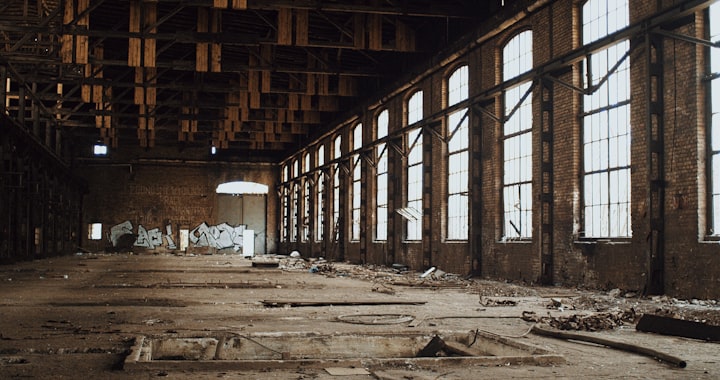Still Life
Sometimes the most human things are those that are anything but.

In a city twinkling with as much life as it does shimmering lights, a rusting robot with no soul left in its chest is a simple thing to misplace.
Forget.
It sits propped against the old factory’s wall, a permanent smile built into its not-face, once glowing orange eyes now dulled to a flat grey. A deep purple used to layer its iron skin, but now all that remains is strips of colour lined with scratches marring the machine’s exterior. Tags are sprayed on by lost artists or desperate adventurers blemish the limbs, disfiguring a being considered the perfected image of mankind.
That was a long time ago, when its legs were swift and agile, moving with the grace of a dancer, speaking with the elegance of a poet, containing mannerisms too human to be considered anything but. Now, all that remains are appendages too stiff to function, rusted in place, an empty power core, and a mind.
To take what makes a seamlessly flawed being powerful is an easy feat, but no human can steal away a mind they do not understand, and have as little control over as their own.
A child steps into its line of sight, the machine’s dead eyes unable to follow the little one’s movement, sealed shut mouth preventing the voice it no longer has from speaking.
She’s young, dressed in a wool sweater riddled with holes, too large to fit her starved frame. Her feet are bare, covered in cuts, old and new, marred with dirt. Brown hair a knotted mess, entangled so thoroughly that each strand had tied itself up and out of her mouse-like face.
With curious, stormy eyes, she peers at the machine. Waiting for it to move when both know it never will.
She leaves shortly after.
Summer heat shifts into a cool breeze as leaves the colour of rusted oranges, muted yellows and vibrant reds are blown into the shattered windows of the factory. Some get stuck in the nooks and cracks of the machine’s body, melting into its form and becoming an everlasting feature.
And then the child returns, a piece of paper-thin plastic in her hands. She picks at it with muddy nails, peeling away a cartoonish image of a rose and sticks it to the robot’s metal skin. Her nose scrunches, lips purse, eyes narrow as her bony fingers gently and delicately smooths out the image that now covers one of the robot’s many scars. She does this a few more times, placing a variety of cartoonish figures along the machine’s arms and face, grinning with crooked teeth.
“Will you be my friend?” she asks.
“Yes,” it wants to reply.
Yes.
But it can’t, and so it doesn’t. With a frown, the child once again turns around, and leaves.
Fall leaves swiftly turn cold and die as plumes of a fluffy white are blown into the factory with the helping hand of strong winds. It’s not long before the white turns to puddles and rain replaces the snow, ushering in green and curious critters. The cycle repeats itself, seasons tearing into seasons.
Sixty seasons. Fifteen years.
Alone.
Until a woman walks into the factory, brown hair pulled back in a neat bun, heels clicking against the concrete floor, wind tearing at her elegant dress of deep purple. She crouches, stormy eyes twinkling, a child’s wagon, rosy red, close behind.
And if it could smile, the machine would beam. If it could cry, there’d be a river.
“I don’t leave my friends behind.”
About the Creator
Casey Boomhour
A daydreaming writer trying for their dream.






Comments
There are no comments for this story
Be the first to respond and start the conversation.